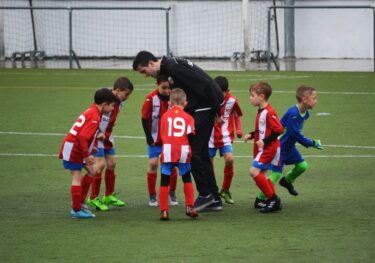WIZWORDsでは英語学習にいろいろな場面(Scene)を設定し、その場面をイメージしながら、学んでいく方法を推奨しています。
英語学習はイメージをすることがとても重要です。
特にある場面設定などを思い浮かべ、会話などをしていることをイメージしながら、学習していくと自分の記憶への定着率も上がっていくのです。
せっかく覚えた英語を記憶から起こして使えなければ学習した甲斐がありませんからね。
使える英語を学習するためには、「場面」をイメージしながらBe動詞と一般動詞を学び、持続可能な英語力を身に付けていきましょう。
「場面」でBe動詞と一般動詞

英語学習は積み上げがとても重要です(重要なので何度でも言います!)。
そして、英語が上達する学習法は、
これだけです!
英語を読んだり、聞いたりしたら、その読んだり聞いたりした言葉を必ず口に出したり、書いたりすることで、英語上達への近道となります。
もちろん、この方法で自分の記憶に定着をさせることを目的としているので、自然と上達していくのです。
私たち人間は、なぜ言葉を覚えることができたかというと、赤ちゃんのときに親から話す言葉をただただ聞き取っていただけではありません。
親としっかりとコミュニケーション(インプット&アウトプット)をしていたから言葉を覚えることができたのです。
なので、英語学習においてインプットとアウトプットの重要さを理解してもらえたと思います。
さらに、WIZWORDsではその場所やその場所での会話などの「場面」をイメージしながら英語を学ぶことでさらなる記憶への定着率を上げる「場面で英語」というものを推奨しています。
それでは、Be動詞と一般動詞を「場面」をイメージしながら英語学習をしていきましょう。
Comprehension of Be Verbs & General Verbs Be動詞と一般動詞への理解

English verbs are divided into be verbs and general verbs. 英語の動詞はBe動詞と一般動詞に分けられます。
The be verb is the one that “explains the subject (S).” Be動詞とは「主語(S)を説明」するもの。
General verbs are divided into intransitive verbs and transitive verbs. Verbs that do not take an object are called intransitive verbs and verbs that take an object are called transitive verbs.
一般動詞は自動詞と他動詞に分けられ、目的語をとらない動詞を自動詞、目的語をとる動詞を他動詞といいます。
Then, let’s focus on learning Be verbs and general verbs. それではBe動詞と一般動詞を重点的に学習していきましょう。
If you understand the Be Verbs & General Verbs, read the English Conversation aloud. Be動詞と一般動詞を理解できたら、声に出して会話文を読んでみましょう。
If you can input them, output them to improve the learning effect. インプットできたら、アウトプットして学習効果を高めましょう。
Be verbs Be動詞
Be動詞とは、「主語(S)を説明」するもの。

Scene at the stadium 球場での場面
|
This field is in Yokohama. この球場は横浜にあります。 It is (It’s) beautiful field. 美しい球場ですね。 |
|
What game is held today? 今日は何の試合が開催されますか? It is (It’s) a softball. ソフトボールです。 |
|
What position is she? 彼女は何のポジションなの? She is a right fielder. ライトです。 |
|
This phot is my daughter. この写真は私の娘です。 Oh, Meg is your daughter. She is adorable. お、メグがあなたの娘、可愛いですね。 |
|
We will win this game! この試合は勝つぞ! Because we are strong! 私たちは強いから! |
Intransitive Verbs 自動詞
自動詞は、「目的語を取らない」動詞。

Scene at school 学校での場面
|
What kind of exercise do you do? どんな運動してるの? I walk every day. 私は毎日歩いています。 |
|
She seems to be athletic. 彼女は運動神経が良さそうだ。 コメント She runs so fast. 彼女は足がとても速い。 |
|
What should he do to check his swimming form? 彼は自分のスイミングフォームを確認するために何をするべきか? He swims slowly. ゆっくり泳ぐことだね。 |
|
Where do you go after school? 学校終わったら、どこ行くの? I go to tutoring school. 塾へ行くんだ。 |
|
I felt refreshed after waking up this morning! 今朝目覚めがすごく良かったんだ! You slept well last night, didn’t you? 昨夜は良く眠れたんでしょ? slept: sleep-slept-slept sleepの過去形 |
Transitive Verbs 他動詞
他動詞は、「目的語(O)を取る」動詞。

Scene in the office オフィスでの場面
|
What happened to her yesterday? 昨日、彼女に何かあったの? コメント I asked her about it. She broke up with her boyfriend. それについて彼女に尋ねたんだ。彼にフラれたんだって。 |
|
His PC is something different. 彼のパソコン何か違うね。 He bought a new PC. 彼は新しいパソコンを買った。 bought: buy-bought-bought buyの過去形 |
|
What do you usually do for fun? 趣味はなんですか? I play a guitar, and also do a harmonica. ギターを弾きますし、ハーモニカも演奏します。 |
|
Where did she visit in Japan last year? 昨年、日本では彼女はどこを訪れたの? She visited Kyoto and Osaka. 京都と大阪を訪れたんだって。 |
|
Although I studied hard my pomotion exam, I failed it. 昇進試験のために一生懸命勉強したけど、失敗しちゃった(泣)。 Failure teaches success. All you have to do is give results in the next exam. 失敗は成功のもと。次の試験で結果を出せばいいんだよ。 |
Comprehension of notice about transitive verbs 注意すべき他動詞への理解

We’ve learned general verbs, but there’s one thing to keep in mind. ひと通り、一般動詞を学習しましたが、注意すべき点がひとつだけあります。
That’s about the transitive verbs. それは他動詞です。
There are other verbs that can be easily mistaken for intransitive verbs, so let me introduce some of them. その他動詞を自動詞と勘違いしやすいものがあるので、いくつかを紹介させてください。
Then, let’s focus on learning notice about transitive verbs. それでは注意すべき他動詞を重点的に学習していきましょう。
Important Notice about Transitive Verbs 注意すべき他動詞

There are several transitive verbs in English that are easily mistaken for intransitive verbs. 英語には意味から考えると自動詞と勘違いしやすい他動詞がいくつかあります。
For example, 例えば、
“We talked about an environmental problem in moral education class.”
“We discussed an environmental problem in moral education class.”
道徳の授業で環境問題について話し合った。
Although “talk” is needed to add “about,” “discuss” is not needed. 「talk」には「about」が必要ですが、「discuss」は不要。
There are transitive verbs like the above, so be careful. このような他動詞があるので、注意が必要です。
He looks like Jonny Depp.
He resembles Jonny Depp.
彼はジョニーデップに似ている。
She has gone to the meeting.
She has attended the meeting.
彼女は会議に出席している。
The typhoon has come close to Japan.
The typhoon has approached Japan.
台風が日本へ近づいている。
I went into the branch of my bank 2 weeks ago.
I entered the branch of my bank 2 weeks ago.
2週間前に銀行の支店へ入った。
We will arrive at Tokyo station at least 5 minutes.
We will get to Tokyo station at least 5 minutes.
We will reach Tokyo station at least 5 minutes.
少なくとも5分で東京駅に着くでしょう。
こんな感じで注意すべき他動詞があります。それでは「場面」で注意すべき他動詞を学んでみよう。
場面で注意すべき他動詞

If you understand the notice about transitive verbs, read the English conversation aloud. 注意すべき他動詞を理解できたら、声に出して会話文を読んでみましょう。
If you can input them, output them to improve the learning effect. インプットできたら、アウトプットして学習効果を高めましょう。
Scene in the office オフィスでの場面
|
When did you talk about an environmental problem? 環境問題についていつ話し話し合いましたか? We discussed an environmental problem in moral education class last week. 先週、道徳の授業で環境問題について話し合った。 |
|
That guy looks cool. あの彼、格好いいね。 He resembles Jonny Depp. 彼はジョニーデップに似ている。 |
|
I haven’t seen Meg for while. Where is she? メグをしばらく見ていない。どこにいるの? She has attended the business trip. 彼女は出張しているよ。 |
|
The wind is blowing strongly. 風が強く吹いているね。 The typhoon has reached Japan. 台風が日本へ近づいているんだよ。 |
|
When did you go into the warehouse? いつ倉庫の中へ入ったの? I entered the warehouse 2 weeks ago. 2週間前に倉庫へ入った。 |
まとめ
場面をイメージしながら、Be動詞と一般動詞、それと注意すべき他動詞を学んでみていかがでしたか。
会話形式になっているので、できれば読んでインプットしたら、発話して(アウトプットして)みてください。黙読するよりは記憶への定着率が必ず上がるはずです。
英文の後に日本語訳があるのは、英語は英語で覚えていくと更なる記憶への定着率が上がるため、敢えてそのようにしています。
これからも、自分の想像力(イメージ力)を駆使しながら、その場所やその場所での会話などの「場面」をイメージしながら英語を学ぶことで更なる記憶への定着率を上げる「場面で英語」を楽しんで学んでもらえたら幸いです。
英語の時制とは簡単にいうと、「出来事がいつ行われたか」を表現する用法です。 時制は英語の文法でもっとも重要なもののひとつですが、市販のテキストや参考書では説明がわかりにくく苦手意識を持っている人も少なくありません。[…]










